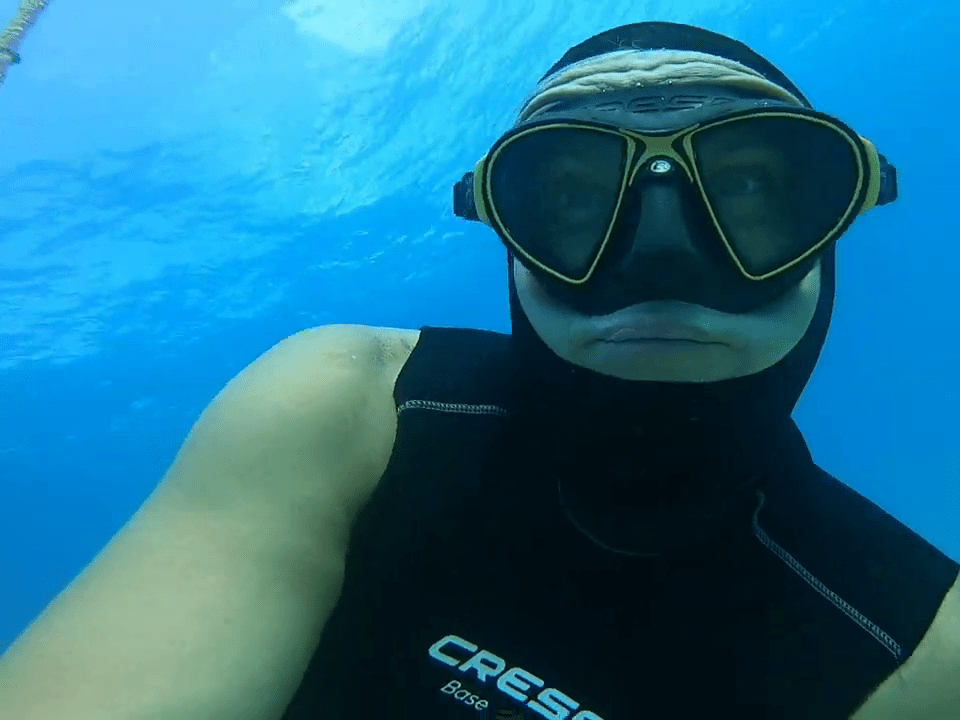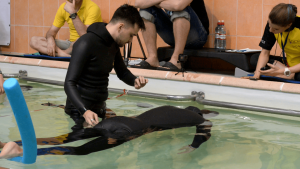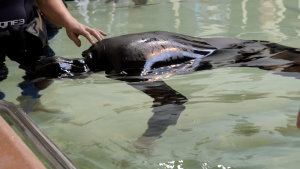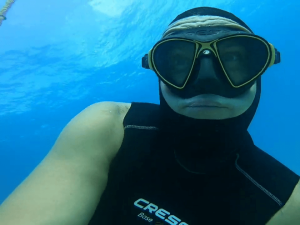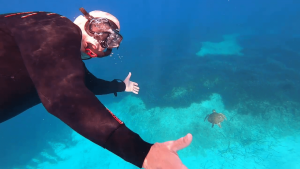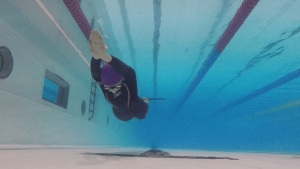Some very advanced divers can hold their breath underwater for more than ten minutes while swimming without a scuba! Sounds extremely unbelievable? We will explain to you what freediving is and how the breathing technique works. Free diving Using breathing techniques not only benefits you when you want to go underwater, but also has many other benefits!
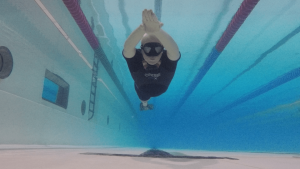
If you feel like holding your breath and freediving (What is taught Valters Preimanis, the only PADI Freediver instructor in Latvia) is too complicated, you can learn to scuba dive first (PADI Open Water Diver course) and then return to freediving.
Table of Contents
Free diving technique
Freediving is a diving technique that relies only on the power of the human body, to be precise, on the human breath. A diver goes underwater without the aid of scuba gear or breathing apparatus. Freedivers simply hold their breath as long as possible before returning to the surface. Thus, a free diver can only travel below the surface for as long as their lungs will take. Since people cannot hold their breath for very long under normal conditions, free divers specifically train their lungs and breath so that they can hold their breath longer underwater. Their training also includes other physical and mental exercises to keep them fit and healthy.
Freediving is one of the most incredible or terrifying sports you can do, depending on how well your lungs and mind are trained. Divers love the feeling of underwater freedom and breaking the laws of nature to the limit. But of course, if you've never dived before, it can be scary. Therefore, proper preparation is required for a free diving experience.
How does the freediving breathing technique work?
The human body senses the need to breathe from the accumulation of carbon dioxide in the body, rather than from the actual lack of oxygen, which means that we are able to hold our breath for much longer than we think. Freediving breathing exercises train us to slowly hold our breath longer, but they are also designed to help us relax our breathing, body and mind.
A diver trains not to give in to the urge to breath that our body sends after about a minute and to ignore the rise in carbon dioxide in the body while diving. The key to staying underwater longer is getting used to taking slow, deep breaths before diving.
As you prepare to free dive, you will begin to make your exhalations longer than your inhales. It lowers the heart rate and helps calm the body and mind to reduce oxygen consumption. Less oxygen consumption also means you can hold your breath longer.
Pausing after each inhalation and exhalation helps to further reduce the rate of breathing. It is important here that the pause at the end of exhalation is longer than at the end of inhalation.
It is also important to breathe as easily as possible. Do not force inhalation and exhalation, but make them passive so as not to strain the intercostal or abdominal muscles and keep the heart rate low. The most important part of preparing for a freediver is to relax as much as possible without hyperventilating. That is the purpose of preparation. Relax your breathing, mind and muscles to actively prepare you for the period of non-breathing (and relaxation).
The last breath before holding the breath should be a complete exhalation to completely empty the lungs of air. Pull in your abdominal muscles to exhale as much air as possible. Then take a final, full and calm breath in three stages, similar to deep yoga breathing. First, expand your stomach, completely filling the lower part of your lungs. Your ribs and chest should not move. Then expand your ribcage and inhale into the center of your lungs. Finally, open your mouth wide and fill your upper lungs, collarbone and throat area.
Next is your free dive - if you dive - and if you don't, just hold your breath as long as you can. You will find that the more you practice your breathing preparation for freediving and the more you get into the mindset of relaxation and control your urge to breathe, the longer you will be able to hold your breath with practice.
What are the benefits of free diving breathing techniques?
The biggest advantage of this breathing exercise is that it helps you relax deeply. It slows down breathing and oxygen intake, thus also relaxing the nervous system and mind. Even if you don't plan to become a freediver, breathing techniques help you relax more and calm your mind.
Breathing exercises reduce stress and anxiety
Breathing like a freediver returns your body to its natural state of rest, the parasympathetic nervous system. Similar to yoga practices, freediving breathing can help slow our heart rate and help our bodies settle into the present moment. The result is less stress and anxiety. A 2013 study demonstrated that freedivers had significantly lower levels of stress, anxiety, and negative affectivity compared to non-freedivers.
Freediving makes you feel better
Freediving not only reduces stress, but also improves mood. During breathing, feel-good neurotransmitters such as adrenaline, noradrenaline, and dopamine are amplified during diving and subsequent breath-holding.
Along with feeling better and less stressed, breathing like a freediver also increases your energy and focus, and clears your mind. Of course, you will be able to focus better on your goals and have more energy to do the things you enjoy.
Freedivers also use their oxygen more efficiently than non-divers. Optimum oxygen utilization also improves breathing, lowers heart rate, increases blood flow to vital organs, and improves overall health.
While you may never have thought about learning how to breathe like a freediver, it's time you did. The many benefits of this breathing exercise are also beneficial for your physical and mental health in everyday life.
Basic freediving courses, PADI Freediver freed diver learns
Pre-diving warm-up exercises, stretching and relaxation
Techniques for maximum respiration
How to assist another diver
Technique for diving properly (Duck dive)
Choosing the right equipment and weight
Rescue of a diver before unconsciousness - LMC (Loss of motor control)
Rescuing a diver unconscious (Blackout) underwater
Where to apply for freediving training (PADI Freediver) in Latvia?
🤿😀 If you are looking for advice or help with the sport of scuba diving or scuba diving, call a PADI Diving Instructor t. 220-77-202 (Whatsapp 220-77-202) to find advice on freediving training (PADI Freediver).

